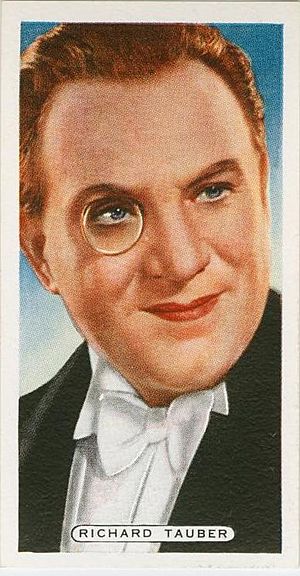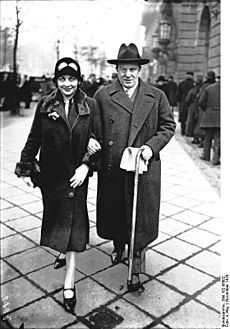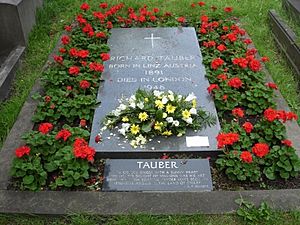Richard Tauber facts for kids
Quick facts for kids
Richard Tauber
|
|
|---|---|

Richard Tauber on a cigarette card
|
|
| Born |
Richard Denemy
16 May 1891 Linz, Austria
|
| Died | 8 January 1948 (aged 56) London, England
|
| Occupation | Opera singer, actor |
| Years active | 1912–1947 |
| Spouse(s) |
Carlotta Vanconti
(m. 1926; div. 1928)Diana Napier
(m. 1936) |
Richard Tauber (born May 16, 1891 – died January 8, 1948) was a famous Austrian opera singer and film actor. He was known for his beautiful tenor voice, which is a high male singing voice. Tauber became very popular for his performances in both operas and operettas, which are lighter, more musical plays.
Contents
Richard Tauber's Early Life
Richard Tauber was born in Linz, Austria. His mother, Elisabeth Seifferth, was an actress, and his father, Richard Anton Tauber, was also an actor. His parents were not married when he was born, and his father was traveling at the time. Richard was first given his mother's maiden name, Richard Denemy.
As a young child, Richard traveled with his mother to different theaters. However, it became difficult for her to care for him, so she left him with foster parents. Later, his father took over raising him. They moved to many different cities, including Graz, Prague, and Berlin.
Becoming a Singer
Richard's father, who had converted to Catholicism, hoped Richard would become a priest. But Richard loved the theater and wanted to be a singer. He tried to impress singing teachers, but they weren't convinced, perhaps because he tried to sing difficult Wagner songs that didn't suit his voice yet.
His father then enrolled him at the Hoch Conservatory in Frankfurt. There, Richard studied piano, how to compose music, and how to conduct an orchestra. He learned very quickly, but his dream of becoming a singer never faded.
Richard Tauber's Music Career Begins
After a lot of vocal training, Richard Tauber made his first public singing performance on May 17, 1912. The next year, his father, who was now in charge of the Municipal Theatre in Chemnitz, helped him get his first opera role. Richard sang as Tamino in The Magic Flute on March 2, 1913.
Soon after, he got a five-year contract with the famous Dresden Opera. He was encouraged to take on smaller roles with other groups to gain more experience. During his time in Dresden, Tauber became known for how quickly he could learn new roles. He once learned an entire opera role in just 48 hours! People started calling him "the SOS Tenor" because he could step in and save a performance when another singer was sick. For example, he learned the role of Calaf in Puccini's Turandot in three days.
Singing in Vienna and Berlin
In 1920, Tauber began performing in Vienna. He made his debut at the Vienna State Opera in La bohème. In 1922, he signed a contract with the Vienna State Opera and also performed with the Berlin State Opera. For many years, he split his time between these two major opera houses. This left him time for concerts and guest appearances around the world.
He sang many important tenor roles in operas like Don Giovanni, Tosca, and Carmen. He also performed in newer works. Richard Tauber performed over 100 different roles in operas and operettas on stage.
Recording His Voice
In June 1919, Richard Tauber made his first recordings. He made over 700 vocal recordings throughout his career. His voice was known for being lyrical and flexible, meaning he could sing smoothly and with great control. He had excellent breath control, which allowed him to sing very softly and beautifully. He was also elegant in his appearance, often wearing a monocle and a top hat.
Operetta Success
Tauber first performed in an operetta (a lighter form of opera with spoken dialogue) in Berlin in 1920. This was a big success and brought him a new audience. It also helped the composer Franz Lehár become popular again. Lehár even wrote several operettas specifically for Richard Tauber. These included Paganini (1925), Der Zarewitsch (1927), and The Land of Smiles (1929). The song "Dein ist mein ganzes Herz" from The Land of Smiles became one of his most famous songs. These popular songs were often called Tauberlieder.
Richard Tauber also appeared in several films, both in Germany and later in England. He even sang the title song for a silent film called I Kiss Your Hand, Madame in 1929.
In 1924, while conducting in Vienna, he met a singer named Carlotta Vanconti. They married in 1926 but separated and divorced in 1928. Later, in 1935, he met the English actress Diana Napier and they married in 1936. Diana Napier appeared in three of his British films.
Leaving Germany
In 1933, Richard Tauber was attacked in the street because of his Jewish background. This made him decide to leave Germany and move back to his home country of Austria. He continued to sing at the Vienna State Opera until March 1938.
Later Career and Challenges
In 1938, Tauber made his London opera debut. Earlier that year, Germany took over Austria. Because of this, the German government took away the Taubers' passports, making them technically stateless. Richard applied to become a British citizen.
When World War II started, he was touring South Africa. He returned to Switzerland and then to the UK in March 1940. Even though he received good offers from the United States, he chose to stay in the UK throughout the war.
During the war, there wasn't much opera, so he earned a living by singing, conducting, and making records and radio broadcasts. He even wrote English operettas. One of his songs, "My Heart and I," became very popular. He had to leave his savings behind in Austria, so only his English recordings brought him money.
Health Issues
By this time, Richard Tauber was suffering from severe arthritis, which made it hard for him to move. When he was recording, engineers had to use a special trolley to move him closer to or further from the microphone for different sound levels.
In 1946, Tauber performed in a show on Broadway in New York, but it was not successful and left him with many debts. To pay these debts, he had to tour the United States, Canada, and South America for six months.
In April 1947, he returned to London with a persistent cough. Doctors eventually diagnosed him with lung cancer. One of his lungs was already not working, and the other was also very sick.
Final Performance
The Vienna State Opera came to London for a short visit in 1947. They invited Tauber to sing one performance with his old company. On September 27, 1947, he sang the role of Don Ottavio in Don Giovanni. It wasn't a huge part, but it had two difficult songs that require great breath control. People who were there said he sang wonderfully and received loud applause. Recordings of these songs from that performance still exist, showing his voice was still strong and clear.
Richard Tauber's Death
Just three days after his last performance, Richard Tauber went into the hospital on October 1, 1947. Doctors tried to remove his left lung to treat the cancer. However, he died from complications on January 8, 1948, in a London clinic. He was buried in Brompton Cemetery in London.
Richard Tauber's Recordings
Richard Tauber made over 720 vocal recordings. He also conducted orchestras for some recordings, playing his own music and works by other composers. His early recordings included songs by Mozart and Tchaikovsky. Later, he recorded albums of German folk songs and songs from Schubert's Winterreise.
Some of his most treasured recordings are four Mozart songs from 1938 and 1939, and a song from Der Freischütz made in 1946. His last recordings included two songs by Richard Strauss. During his lifetime, his many recordings of Franz Lehár's music, much of which was written for him, were best sellers. He also had popular recordings of his own songs from the operetta Old Chelsea. Many of his radio broadcasts have also been saved.
Richard Tauber's Films
Richard Tauber appeared in several films during his career:
- I Kiss Your Hand, Madame (1929)
- Never Trust a Woman (1930)
- End of the Rainbow (1930)
- The Land of Smiles (1930)
- The Big Attraction (1931)
- Melody of Love (1932)
- Blossom Time (1934)
- Heart's Desire (1935)
- Land Without Music (1936)
- Pagliacci (1936)
- Waltz Time (1945)
- Lisbon Story (1946)
Images for kids
See also
 In Spanish: Richard Tauber para niños
In Spanish: Richard Tauber para niños




